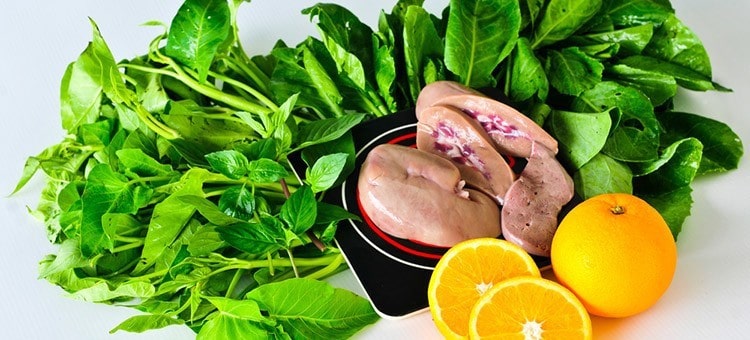
Folate, also known as vitamin B9, is an essential nutrient in your diet. While synthetic folic acid is added to some processed foods, natural folate from the foods you eat is both safer and superior.
Ahead are some of the many health benefits of folate, the best food sources and why it’s better to get your vitamin B9 from dietary sources rather than supplements or ‘enriched’ supermarket products.
What is Folate Good For?
Vitamin B9 plays an important role in cellular growth and maintenance throughout your body in the way it influences DNA synthesis and repair. Folate can be considered an ‘activator’ of vital cardiovascular, neurological and developmental processes within human DNA and folate deficiency can have some serious health consequences.
Folate for Cardiovascular Health
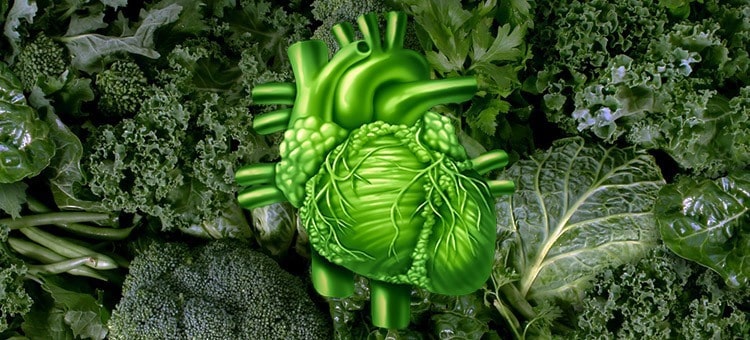
Homocysteine is an amino acid that is found circulating in your blood. While it’s normal to have a small amount of homocysteine, elevated levels of this compound have been consistently associated with atherosclerosis and coronary heart disease.
Folate is needed to metabolize homocysteine into the essential amino acid methionine for muscular growth and repair. When vitamin B9 is low in your body, homocysteine levels have been shown to increase.
Elevated homocysteine or hyperhomocysteinemia also increase the risk of blood vessel damage and internal blood clotting leading to a stroke. Low folate intake has even been linked to high LDL cholesterol levels, another predictor of heart disease.
For a healthy heart and well functioning cardiovascular system, folate is an important nutritional element for normalizing homocysteine levels and good health in general.
Brain Health
Korean researchers have found a link between low folate levels and dementia and other markers of declining neurological health. Once again, elevated homocysteine levels are believed to be responsible with more folate found to be the remedy.
Vitamin B9, along with other B vitamins, is involved in the creation and proper function of neurotransmitters within your brain and many people report folate to be beneficial for reducing brain fog.
Folate deficiency has also been linked to feelings of irritability, depression and insomnia. Of course they can be many other potential causes of these conditions but the high folate foods listed ahead may help if you are experiencing health issues like these.
Male Infertility
Folate is necessary for both sperm creation and proper functioning. Men with a low intake of folate have been shown to often have sperm with a defective chromosomal structure.
Increasing dietary folate may help improve sperm quality and assist men with infertility problems trying to achieve a successful pregnancy with their partner.
Folate Before and During Pregnancy
Vitamin B9 plays a vital role in fetal development during pregnancy. A deficiency in folate, both before and in the early stages of being pregnant can lead to neural tube defects, a serious problem that can result in the baby being born with spina bifida or the pregnancy terminated.
Researchers found increasing folate intake for one month prior to conception and up to three months after can greatly reduce the risk of neural tube defects.
Folate is so important for pregnant women that doctors will usually advise taking a folic acid supplement (the synthetic version of folate) for expectant mothers. This is likely good advice in such situations, but given increased folate levels are beneficial for a full month before conception, a far better option is to be already including high folate foods in your diet if you are trying to get pregnant.
The Difference between Folate and Folic Acid
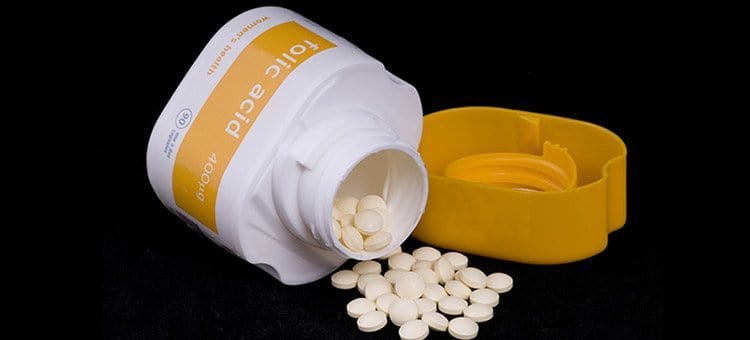
Soon after the importance of folate in preventing birth defects was discovered, the synthetic version of vitamin B9, folic acid, began being added into commonly eaten foods and drinks like bread and milk.
While this decision has likely been important for preventing birth defects in mothers with diets lacking in natural sources of B9, there is some concern that supplemental synthetic folic acid may not be so beneficial for men and women not intending to get pregnant.
Folate is actually better termed folates as vitamin B9 is in reality a series of water-soluble B vitamins. Tetrahydrofolate is the usable form and folates are metabolized into it within your small intestine.
Folic acid on the other hand is a similar but synthetic compound which has to be processed by your liver into tetrahydrofolate. This processing requires the enzyme dihydrofolate reductase, but low levels of this enzyme combined with a high intake of folic acid from fortified foods and supplements may lead to unmetabolized folic acid circulating in the body with unknown consequences.
Chris Kresser has a detailed article on this process and the potential dangers of excessive folic acid intake. The important takeaway is that ‘enriched’ processed foods and supplemental folic acid can’t compare with the benefits of natural folate from good food sources. Let’s have a look at eight of the best now.
8 High Folate Foods
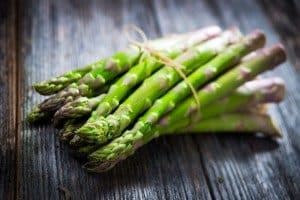 1. Asparagus
1. Asparagus
Nutrient dense asparagus is around 65% the recommended daily intake of folate and is rich in other vitamins like vitamin K, vitamin A and vitamin C.
2. Leafy Greens
Most dark leafy greens are a great source of folate with spinach, collard greens, mustard greens, bok choy and romaine lettuce amongst the best.
3. Citrus Fruits
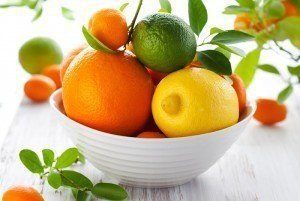 Oranges and other citrus are great source of folate when eaten or freshly squeezed but avoid high sugar packaged orange juice. The fact that this product is sometimes ‘fortified’ with folic acid, even though the source fruit was initially high in folate, goes to show just how much nutrition is processed out of most supermarket foods.
Oranges and other citrus are great source of folate when eaten or freshly squeezed but avoid high sugar packaged orange juice. The fact that this product is sometimes ‘fortified’ with folic acid, even though the source fruit was initially high in folate, goes to show just how much nutrition is processed out of most supermarket foods.
4. Beans and Pulses
 Lentils, pinto beans, black beans, navy beans and split peas are all high sources of folate (assuming you can tolerate them without too much gas).
Lentils, pinto beans, black beans, navy beans and split peas are all high sources of folate (assuming you can tolerate them without too much gas).
5. Broccoli
Nutritional superstar broccoli has many health benefits. Amongst them is around a quarter of the RDI of folate in a cup of the steamed vegetable.
6. Seeds and Nuts
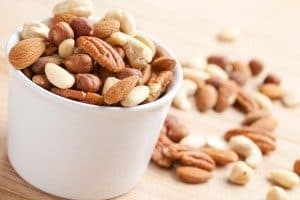 Many seeds and nuts contain folate, with almonds, flax seed and vitamin E and magnesium rich sunflower seeds some of the best.
Many seeds and nuts contain folate, with almonds, flax seed and vitamin E and magnesium rich sunflower seeds some of the best.
7. Liver
Chicken and beef liver is a very high source of folate and many other nutrients, but these aren’t that commonly eaten by most people.
8. Avocado
Delicious avocados turn up again and again as one of the healthiest foods. Along with all of their other nutrients, avocados are beneficial source of folate, with nutritional data listing 22% of the recommended daily intake of folate.
Getting Your Folate
Getting a good supply of folate into your diet to protect your brain and cardiovascular system shouldn’t be difficult if you eat a wide variety of natural foods like these. Women who intend to get pregnant would do well to increase these kind of foods in their diet, both before and after conception for the health of the baby.
Did you know the difference between folate and folic acid and, aside from women wanting to get pregnant, do you think it’s right that folic acid is added to processed foods or should we rely on naturally high folate foods like those listed above?
Leave a comment